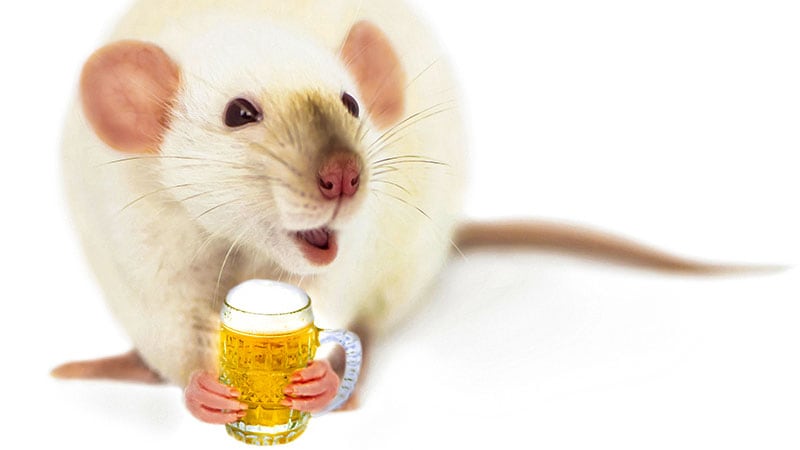Why Scientists Are Using FGF21 to Treat Alcohol Poisoning
Keskeiset käsitteet
FGF21 shows promise in treating severe alcohol poisoning by stimulating alertness and motor control in mice.
Tiivistelmä
Introduction
- Researchers explore using FGF21 to revive drunk individuals.
- FGF21, a liver hormone, has shown potential in various treatments.
FGF21 Effects on Drunk Mice
- Injected mice regained balance and alertness faster with FGF21.
- The hormone stimulates the brain to release norepinephrine, enhancing alertness.
Comparison to Naloxone
- FGF21's effects likened to naloxone spray for opioid overdoses.
- Study results published in Cell Metabolism.
Mechanism of Action
- FGF21 stimulates brain regions to release norepinephrine.
- Mice lacking norepinephrine production showed no response to FGF21.
Treatment Efficacy
- Mice treated with FGF21 recovered faster from alcohol-induced impairment.
- FGF21 could provide temporary motor control and alertness in severe alcohol poisoning cases.
Limitations and Specificity
- FGF21 treatment does not alter blood alcohol content.
- The hormone only counteracts alcohol, not other sedatives.
Potential Clinical Applications
- FGF21 shows promise in treating alcoholism and fatty liver disease.
- Clinical trials underway for nonalcoholic steatohepatitis treatment.
Mukauta tiivistelmää
Kirjoita tekoälyn avulla
Luo viitteet
Käännä lähde
toiselle kielelle
Luo miellekartta
lähdeaineistosta
Siirry lähteeseen
www.medscape.com
Why Are Scientists Getting Mice Drunk?
Tilastot
"Mice that had been genetically modified to not produce norepinephrine had no response to FGF21."
"Those given FGF21 shots were able to get back on their feet in 1 hour and 40 minutes, compared to 3 hours and 46 minutes in mice that didn't receive FGF21."
"Monkeys given a long-acting analogue of FGF21 drank 50% less alcohol over 25 days compared to monkeys that didn't receive the treatment."
Lainaukset
"I would put it in the same kind of context, a little bit, as Narcan." - David Mangelsdorf, PhD
"This is not a party drug." - Steven Kliewer, PhD
Tärkeimmät oivallukset
by Denny Watkin... klo www.medscape.com 04-06-2023
http://www.medscape.com/viewarticle/990531
Syvällisempiä Kysymyksiä
How can the potential use of FGF21 in treating alcoholism impact current addiction treatments?
The potential use of FGF21 in treating alcoholism could have a significant impact on current addiction treatments. FGF21 has shown promising results in reducing alcohol consumption in animal studies, indicating its potential as a medication for alcohol use disorder. If FGF21 analogues can be safely used in humans, it could provide a new approach to treating alcoholism. This could be particularly beneficial for individuals who have not responded well to traditional addiction treatments or who struggle with relapse. By targeting the biological mechanisms involved in alcohol consumption, FGF21 could offer a more effective and targeted treatment option for alcohol use disorder.
What ethical considerations should be taken into account when using FGF21 for alcohol-related conditions?
When using FGF21 for alcohol-related conditions, several ethical considerations should be taken into account. Firstly, the safety and efficacy of FGF21 analogues in humans need to be thoroughly evaluated through clinical trials to ensure that the benefits outweigh any potential risks. Additionally, the use of FGF21 should be carefully monitored to prevent misuse or diversion for non-medical purposes. Patients should be fully informed about the treatment, including potential side effects and limitations, to ensure they can make informed decisions about their care. Furthermore, access to FGF21 treatment should be equitable and affordable to prevent disparities in healthcare access based on socioeconomic status or other factors.
How does the evolutionary perspective on FGF21 production shed light on modern challenges with alcohol consumption?
The evolutionary perspective on FGF21 production provides insights into modern challenges with alcohol consumption. FGF21 is produced by the liver in response to stress, including alcohol consumption, as a protective mechanism. This suggests that our bodies have evolved to respond to alcohol intake by increasing water consumption and alertness to mitigate the effects of intoxication. However, the modern prevalence of distilled spirits and excessive alcohol consumption can overwhelm this natural response, leading to alcohol-related health issues. Understanding the evolutionary basis of FGF21 production highlights the mismatch between our biological adaptations and contemporary drinking habits, shedding light on the need for innovative approaches, such as FGF21 treatment, to address alcohol-related conditions in the modern world.
0
